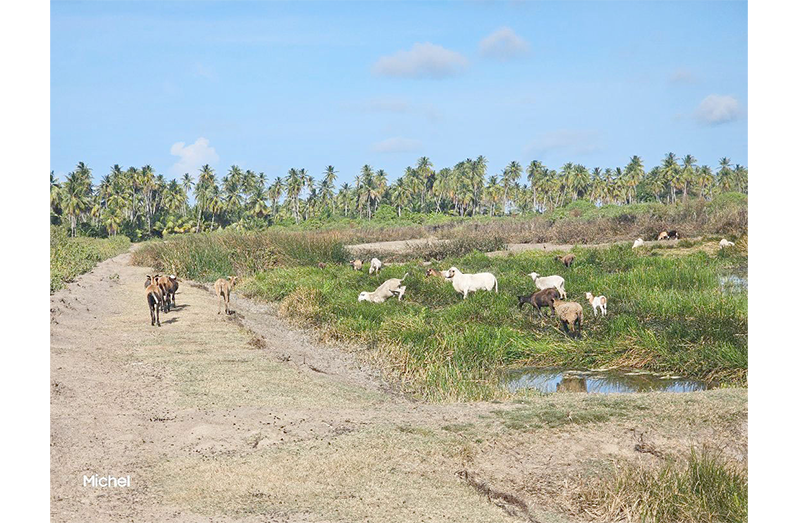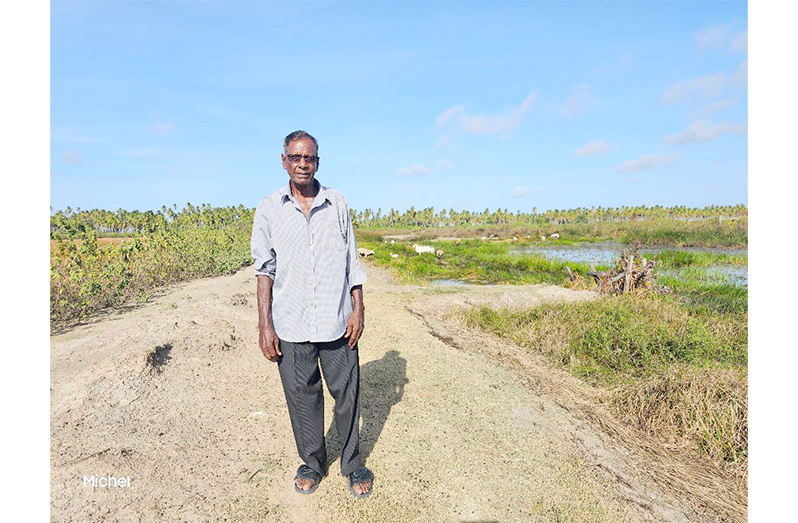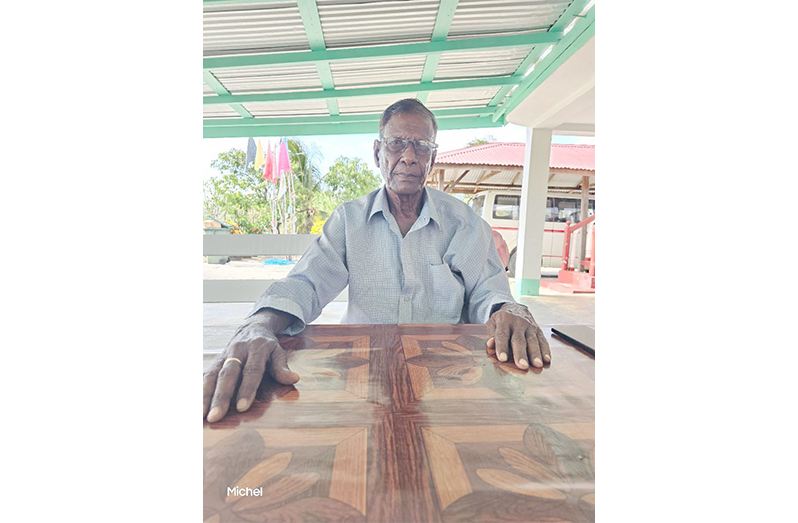Chatenauth Singh reflects on his passion for livestock farming
AT seventy-nine years old, when most retirees are content to rest and enjoy the simple pleasures of life, Mr. Chatenauth Singh of Foulis, West Coast Berbice, remains actively engaged in livestock farming.
A former prison officer who served the Guyana Prison Service (GPS) for eighteen years, Singh has chosen to spend his retirement years productively tending to his flock of sheep and contributing to Guyana’s agricultural development.

Today, Singh serves as Chairman of the Farmers United Association of Plantation Foulis, a small but committed group comprising fifteen members, most of whom are livestock farmers.
His flock of sixty sheep comprising of cross breeds of Barbados Black Belly, Katahdin, and Santanese, represents his main source of income and his enduring passion for animal husbandry.
Singh’s journey in agriculture began at the tender age of fourteen when he assisted his father, a cash crop farmer, in the fields.
“Those early days were my foundation,” he reflected. “Farming taught me responsibility, discipline, and the value of hard work. It was how my father provided for us.”
After completing secondary school, Singh joined the Guyana Prison Service, where he served at several locations across the country.
Upon retirement, he returned to his agricultural roots in Foulis, converting every available space in his yard into productive land for fruits, vegetables, coconuts, and livestock.
His dedication to farming, even in his later years, has earned him the respect of fellow farmers and residents alike.

FOULIS: A THRIVING LIVESTOCK COMMUNITY
The West Coast Berbice village is part of the larger agricultural belt of Region Five (Mahaica–Berbice), one of Guyana’s most productive farming regions.
Foulis is particularly known for its vibrant livestock sector, where farmers rear cattle, sheep, goats, and poultry.
The animals often look for forage among the mangroves that line Guyana’s coast, feeding naturally while contributing to an environmentally balanced system.
However, despite this natural advantage, local farmers face a significant challenge of limited access to adequate grazing areas.
During the dry season, when natural grass becomes scarce, many farmers must purchase or prepare supplemental feed, which increases the overall cost of production.
To address this ongoing challenge, Singh and other farmers in Foulis want to collaborate with the Guyana Livestock Development Authority (GLDA) through the Ministry of Agriculture to establish a communal pasture.
Such a facility would provide a sustainable grazing system for small ruminants, ensuring a reliable supply of grass year-round.
“Having access to a shared pasture will not only reduce our feed costs but will also help improve the quality and health of our animals,” Singh explained. “We are ready to work with GLDA to monitor and maintain it, so that everyone benefits.”
This collaborative approach would also allow farmers to implement better pasture management practices, including rotational grazing and controlled forage production measures that would strengthen the long-term sustainability of livestock farming in the area.
Mr. Singh expressed appreciation for the continued technical support extended by GLDA under the leadership of Dr. Dwight Waldron.
He noted that farmers in Foulis have benefitted significantly from the government’s livestock development initiatives, including the Barbados Black Belly Genetic Improvement programme that has improved animal genetics across the region.
As a result of improved breeds and the Government of Guyana’s Barbados Black Belly Sheep Genetic Improvement Programme, farmers like Singh—who have benefitted directly from this initiative are witnessing better-quality meat, increased birth weights, and a higher number of lambs born per ewe.
The introduction of improved genetic stock has therefore enhanced both the productivity and profitability of small ruminant farming in Foulis and surrounding communities.
“The sheep in Foulis are among the best in Region Five because of these genetic improvements,” Singh said proudly. “We are seeing stronger animals, better growth rates, and more productive flocks. It’s truly encouraging.”
Farmers in the area have also benefitted from other initiatives such as the Black Giant poultry project, which helped boost local poultry production.
These programmes, Singh added, are part of the government’s broader efforts to enhance food security and expand Guyana’s agricultural capacity in line with President Dr. Irfaan Ali’s vision of sustainable national development.
While the livestock sector in Foulis continues to thrive, farmers have recently faced a growing threat—attacks by stray dogs.
Within a single month, Singh and two other farmers lost more than thirty-five mature sheep to dog attacks, primarily from packs believed to have originated from nearby villages.
Despite filing reports with the police, Singh said that little action was taken, prompting calls for stronger enforcement of animal welfare and protection laws.
The GLDA has since provided assistance to affected farmers, helping them to recover and strengthen their flocks.
SUSTAINING A LEGACY OF AGRICULTURE
Through decades of service, both in uniform and in the field, Mr. Singh embodies the resilience and dedication of Guyana’s rural farming community.
His continued involvement in agriculture at an age when most would retire fully from active work is a testament to his enduring love for the land and his commitment to food production.
In Region Five, livestock farmers like Singh take pride in their role as major contributors to national and regional food security.
They see themselves as partners in Guyana’s development agenda and are eager to expand their production capacity with continued institutional support.
“As farmers, we are proud of what we produce,” Singh affirmed. “Foulis has some of the best livestock in the country, and with the continued guidance of GLDA and the Ministry of Agriculture, we will keep improving. Agriculture is not just a livelihood, it’s a legacy.”
Singh is also instrumental in community-level development, and his role makes him stand out as a leader in the village not only among his fellow farmers but with the locals too.
His home is always open to both farmers and residents, who often stop by to share their concerns, have issues addressed and to engage in friendly banter.
Singh’s yard is one to envy as it is very well-kept with rows of fruit trees such as papaya, banana and mangoes and vegetables such as callaloo, pumpkin, pepper, thick leaf thyme and tomatoes.





.jpg)








